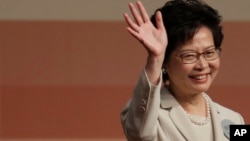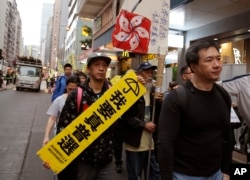A Beijing-backed civil servant, Carrie Lam, was chosen to be Hong Kong’s next leader Sunday amid accusations that Beijing is meddling and denying the financial hub a more populist leader perhaps better able to defuse political tension.
The majority of the China-ruled city’s 7.3 million people have no say in deciding their leader, who is chosen from several candidates by a 1,200-person “election committee” stacked with pro-Beijing and pro-establishment loyalists.
Lam, who will become Hong Kong’s first female chief executive when she takes office July 1, won 777 votes compared with 365 for her closest rival, former financial secretary John Tsang, who polls show is more popular.
A third candidate, retired judge Woo Kwok-hing, got 21 votes.
Protesters scuffle with police
Some scuffles broke out outside the voting center between protesters and a large contingent of police, who used metal barricades to keep the demonstrations well away.
The activists denounced Beijing’s interference amid widespread reports of unprecedented lobbying of voters to back Lam, rather than Tsang, chanting “I want universal suffrage” when the result was announced.
“Lies, coercion, whitewash,” read one banner. A big yellow banner calling for full democracy was hung from the Lion Rock peak overlooking the city.
“The central government has intervened again and again,” said Carmen Tong, a 20-year-old student. “It’s very unjust.”
China's unwelcome hand
Since Hong Kong returned to Chinese rule in 1997, Beijing has gradually increased control over it, even though China had promised wide-ranging freedoms and autonomy not allowed on the mainland under the formula of “one country, two systems.” There was also an undated promise of universal suffrage.
Many, including opposition democrats, fear Lam will continue the tough policies of staunchly pro-Beijing incumbent Leung Chun-ying, a controversial figure who ordered the firing of tear gas on pro-democracy protesters in 2014 and who was not seen to be defending Hong Kong’s autonomy and core values.
“She doesn’t have a strong foundation, nor will she have a honeymoon after she’s elected,” said political scientist Ivan Choy. “But whether she will further divide society, we still have to wait and see what she does, whether she will continue the approach of Leung.”
Difficult line to walk
All of Hong Kong’s three other post-handover leaders have struggled to balance the demands of China’s stability-obsessed Communist Party leaders, with the wish of many residents to preserve the global financial hub’s liberal values and rule of law that have long underpinned its economic success.
In late 2014, parts of the city were paralyzed when tens of thousands of protesters blocked major roads for nearly three months to demand Beijing allow the city full democracy; demands that were ignored amid some violent clashes.
Some see China’s creeping interference in many areas of the city including business, media, politics, academia and the judiciary as tarnishing the city’s international business allure.






